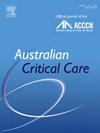临床医生对重症监护室机械通气患者选择性消化道去污的看法:一项调查。
IF 2.6
3区 医学
Q2 CRITICAL CARE MEDICINE
引用次数: 0
摘要
目的:探讨选择性消化道去污(SDD)作为降低重症监护病房(ICU)机械通气患者呼吸机相关性肺炎(VAP)和其他医疗相关感染发生率的策略。有一些证据表明,使用SDD与降低卫生保健相关感染和死亡率有关;然而,在澳大利亚和新西兰(ANZ)的icu中,SDD的使用率仍然很低。为了更好地了解潜在的原因,我们设计了一份问卷,收集重症监护医学、传染病和医学微生物学专家的意见。设计:该研究结合了在线调查。环境和参与者:一份在线调查被分发给在澳新银行工作的重症监护医学、传染病和医学微生物学专家。主要结果测量:主要结果测量是关于SDD的观点和在澳新银行icu中实施的感知障碍。结果:共获得103份回复,其中重症医学专科55份,传染病/医学微生物学专科55份。没有受访者目前在其医院ICU使用SDD。重症监护医学专家自我报告对SDD的证据基础有更好的理解(P = 0.032),并且更有可能相信SDD是一种安全的治疗方法(P结论:重症监护医学专家对通气患者使用SDD的看法比传染病/医学微生物学专家更积极,但没有受访者报告在临床实践中使用SDD。本文章由计算机程序翻译,如有差异,请以英文原文为准。
Clinician views on selective decontamination of the digestive tract in mechanically ventilated patients in intensive care units: A survey
Objective
Selective decontamination of the digestive tract (SDD) has been investigated as a strategy to reduce the incidence of ventilator-associated pneumonia (VAP) and other healthcare-associated infections in intensive care unit (ICU) patients receiving mechanical ventilation. There is some evidence to suggest that the use of SDD is associated with a reduction in healthcare-associated infection and mortality; however, the uptake of SDD in ICUs in Australia and New Zealand (ANZ) remains low. To better understand the potential reasons, we designed a questionnaire to gather views from specialists in intensive care medicine, infectious diseases, and medical microbiology.
Design
The study incorporated an online survey.
Setting and participants
An online survey was distributed to specialists in intensive care medicine, infectious diseases, and medical microbiology working in ANZ.
Main outcome measures
The main outcome measures are views about SDD and perceived barriers to implementation in ICUs in ANZ.
Results
A total of 103 responses were obtained, of which 55 were from intensive care medicine specialists and the remainder from infectious disease/medical microbiology specialists. No respondents currently used SDD in their hospital ICU. Intensive care medicine specialists self-reported better understanding of the evidence base regarding SDD (P = 0.032) and were more likely to believe that SDD was a safe therapy (P < 0.001) and that it was associated with a reduction in the incidence of VAP (P < 0.001) and ICU mortality (P < 0.001). Infectious disease/medical microbiology specialists were more likely to believe there is currently a lack of evidence of benefit (P < 0.001) and a risk of harm (P < 0.001) associated with SDD.
Conclusions
Specialists in intensive care medicine had more positive views about use of SDD in ventilated patients than did specialists in infectious diseases/medical microbiology, but no respondents reported using SDD in their clinical practice.
求助全文
通过发布文献求助,成功后即可免费获取论文全文。
去求助
来源期刊

Australian Critical Care
NURSING-NURSING
CiteScore
4.90
自引率
9.10%
发文量
148
审稿时长
>12 weeks
期刊介绍:
Australian Critical Care is the official journal of the Australian College of Critical Care Nurses (ACCCN). It is a bi-monthly peer-reviewed journal, providing clinically relevant research, reviews and articles of interest to the critical care community. Australian Critical Care publishes peer-reviewed scholarly papers that report research findings, research-based reviews, discussion papers and commentaries which are of interest to an international readership of critical care practitioners, educators, administrators and researchers. Interprofessional articles are welcomed.
 求助内容:
求助内容: 应助结果提醒方式:
应助结果提醒方式:


